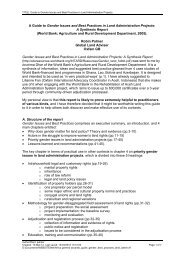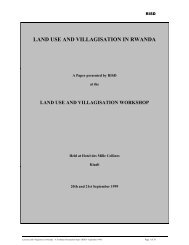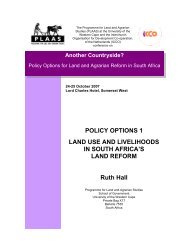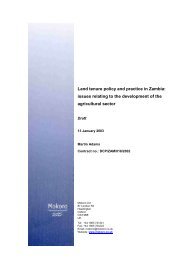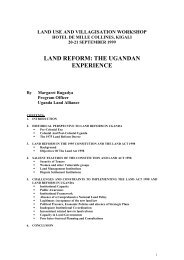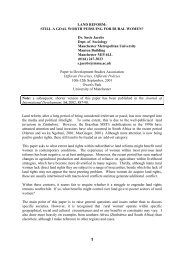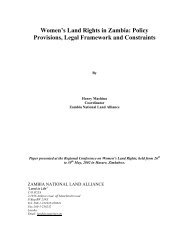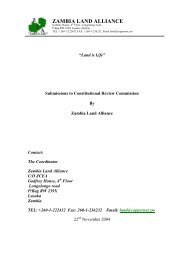The 1999 Land Act and Village Land Act - Mokoro
The 1999 Land Act and Village Land Act - Mokoro
The 1999 Land Act and Village Land Act - Mokoro
You also want an ePaper? Increase the reach of your titles
YUMPU automatically turns print PDFs into web optimized ePapers that Google loves.
<strong>The</strong> <strong>1999</strong> <strong>L<strong>and</strong></strong> <strong>Act</strong> <strong>and</strong> <strong>Village</strong> <strong>L<strong>and</strong></strong> <strong>Act</strong> 4for rights of occupancy” (s. 12). It is explicitly stated in the <strong>Act</strong> that the Commissioner is notbound to act on the recommendations of the <strong>L<strong>and</strong></strong> Allocation Committees (s. 26).<strong>The</strong> provisions for a market in l<strong>and</strong>One issue, which has received some attention, is the much-vaunted allowance for a l<strong>and</strong> market.Section 31 of the <strong>L<strong>and</strong></strong> <strong>Act</strong> states that the “Minister may require the payment of a premium onthe grant of a right of occupancy.” <strong>The</strong> premium shall be decided by the Minister, who isdirected to have regard to factors such as prevailing market prices <strong>and</strong> the assessment of aqualified valuer. In section 52, we find that the Minister may direct that the l<strong>and</strong> be sold at anauction or through a process of tendering, with the relevant procedures to be according toregulations made by the Minister. As we can see, the scope for discretion is considerable, <strong>and</strong> itis doubtful whether these provisions provide any strong guarantees against l<strong>and</strong> being granted tocompanies or individuals at below market rate. <strong>The</strong> absence of any such guarantee, of course,continues to leave room for illicit rent seeking in the allocation of l<strong>and</strong>.For a holder of a Granted Right of Occupancy wishing to sell, there is still less evidence ofanything approximating an open l<strong>and</strong> market. Enigmatically, the <strong>Act</strong> provides that:“Unless otherwise provided for by this <strong>Act</strong> or regulations under this <strong>Act</strong>, a disposition of a right ofoccupancy shall not require the consent of the Commissioner or an authorized officer” (Section 36(2)).<strong>The</strong> following sub-section provides the significant proviso that the seller is required to notify theCommissioner, <strong>and</strong> that the Commissioner needs to “endorse” the notification before theRegistrar of l<strong>and</strong> can register the transfer. <strong>The</strong> <strong>Act</strong> further explicitly states that grants that havebeen held for less than three years require prior approval from the Commissioner (s. 37). Insection 38 we find that the Commissioner may, at his or her discretion, ask for any additionalinformation relevant to the sale <strong>and</strong> direct that the sale shall not take place before approval isgranted. In other words, no formal approval is required unless the Commissioner says otherwise.Grounds for refusing approval range from non-fulfilment of development conditions, anyprevious criminal record of the seller, suspicion that the l<strong>and</strong> is being sold at below market valueor that there is any form of corrupt influences involved. Approval may also be refused if there isa breach of the rights of any disadvantaged groups, such as women, children or low-incomepersons. 4Even after a sale has been formally registered, the Commissioner may, within two years of thetransfer, move to annul it. In this period, the Commissioner may annul the sale if he or she “hasreasonable cause to believe” that the sale has been “affected by fraud, or undue influence, or lackof good faith, or the fact that one party appears to have taken unfair advantage over anotherparty...” (s. 38 (3)). It is indicative of the overall spirit of the <strong>Act</strong> that this kind of safeguard is putin the h<strong>and</strong>s of the head administrator, rather than the courts. <strong>The</strong> provision of retroactiveadministrative scrutiny only serves to add an unnecessary layer of bureaucracy <strong>and</strong> uncertainty towhat is already a dense wall of bureaucratic procedures <strong>and</strong> discretionary decision-making.Considering all the above, it is clear that the new <strong>Act</strong> provides no strong guarantee for would-be4 <strong>The</strong> <strong>L<strong>and</strong></strong> (Fines) Regulations (GN 84, 2001) sets a fine of 2% of the value of the l<strong>and</strong> for the following offence:“Disposition of the Right of Occupancy or part thereof without the approval of the Commissioner of <strong>L<strong>and</strong></strong>s or authorizedofficer.” This further illustrate the ambiguity connected to whether there is an explicit requirement to have the approval ofthe Commissioner for the disposition of a right of occupancy.




